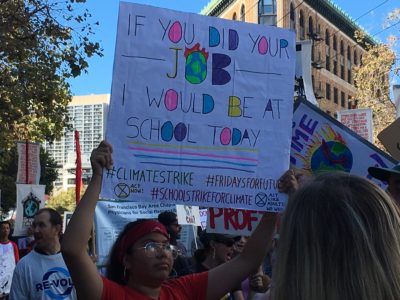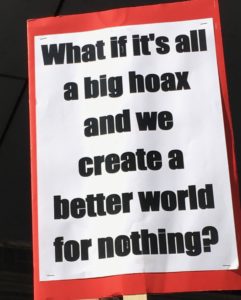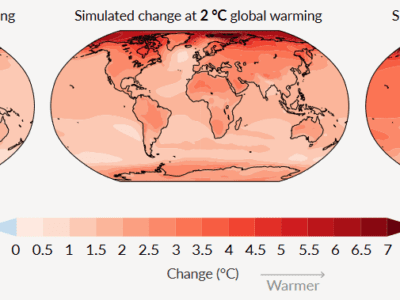Teach Your Parents Well
A view from the Youth Climate Strike in S.F.
Youth Climate Strike signs and the young marchers holding them in San Francisco toda y were fed up, hopeful, witty and powerful—and offered helpful lessons to those of us entrusted with training the next generation of environmental advocates. Protesters offered concrete green visions (Only 363 offshore wind turbines needed to power the city of San Francisco); policy prescriptions (Put a price on it: Support H.R. 763); root-cause interventions (Please f*cking vote!); secessionist fantasies (New California Republic); funny stuff (The wrong Amazon is burning; The wrong I.C.E. is melting); and potent critiques (Why should we go to school if you won’t listen to the educated?).
y were fed up, hopeful, witty and powerful—and offered helpful lessons to those of us entrusted with training the next generation of environmental advocates. Protesters offered concrete green visions (Only 363 offshore wind turbines needed to power the city of San Francisco); policy prescriptions (Put a price on it: Support H.R. 763); root-cause interventions (Please f*cking vote!); secessionist fantasies (New California Republic); funny stuff (The wrong Amazon is burning; The wrong I.C.E. is melting); and potent critiques (Why should we go to school if you won’t listen to the educated?).
The youth mobilization reinforced the need to meet our students’ sense of urgency with a sense of agency; to balance their despair with reasons for hope; and to find ever-new ways to tell the climate crisis story to maintain public and media engagement. In this spirit, our UC Berkeley Environmental Law Clinic has a climate change “despair docket” of rear-guard actions (see our past Legal Planet post regarding Clinic comments on EPA’s rollback of tailpipe emissions standards), but also a “hope docket” of matters in which we can move climate policy forward. Last fall, for example, the Clinic’s advocacy at the California Public Utilities Commission on behalf of disadvantaged communities helped secure $56 million in investment in renewable energy for more than 1600 San Joaquin Valley households. And the Clinic’s efforts—along with those of many others—last week helped produce a Commission decision to allocate $10 million to support battery storage projects in these communities, improving their climate resilience.
As to new narratives: we’ve assembled a plaintiff coalition of gifted storytellers including a Gulf Coast subsistence fisher, an Inupiat nurse, a marine toxicologist, and an Alaska inlet-keeper for litigation focusing attention on an overlooked harm related to oil dependence: the use of toxic dispersant chemicals in the wake of offshore oil spills, pursuant to an antiquated federal response plan that we contend violates the Clean Water Act. These chemical dispersants caused broad-scale harm to coastal residents and the marine ecosystem when used in the BP Deepwater Horizon spill response a decade ago; their legacy persists as still-pending tort claims, and chronic health problems in some of our clients. This new angle on the perils of renewed offshore oil drilling sufficiently intrigued reporters that even our (inherently preliminary) Notice of Intent to Sue was covered by more than two dozen media outlets nationwide, and was the subject of a Washington Post feature.
This messaging success notwithstanding, it was deeply humbling to witness the power and creativity of today’s youth voices. I’ve read many responses to climate deniers, but few as succinct or persuasive as that offered at the march:
“What if it’s all a big hoax and we create a better world for nothing?”

Going forward, I expect to consult more fully with the under-18 crowd when seeking resonant issue framing.
Reader Comments
2 Replies to “Teach Your Parents Well”
Comments are closed.






Great article! I look forward to updates about the Law Clinic’s work and your engagement of the under-eighteen advocates.
I believe in climate and hope to convince my parents